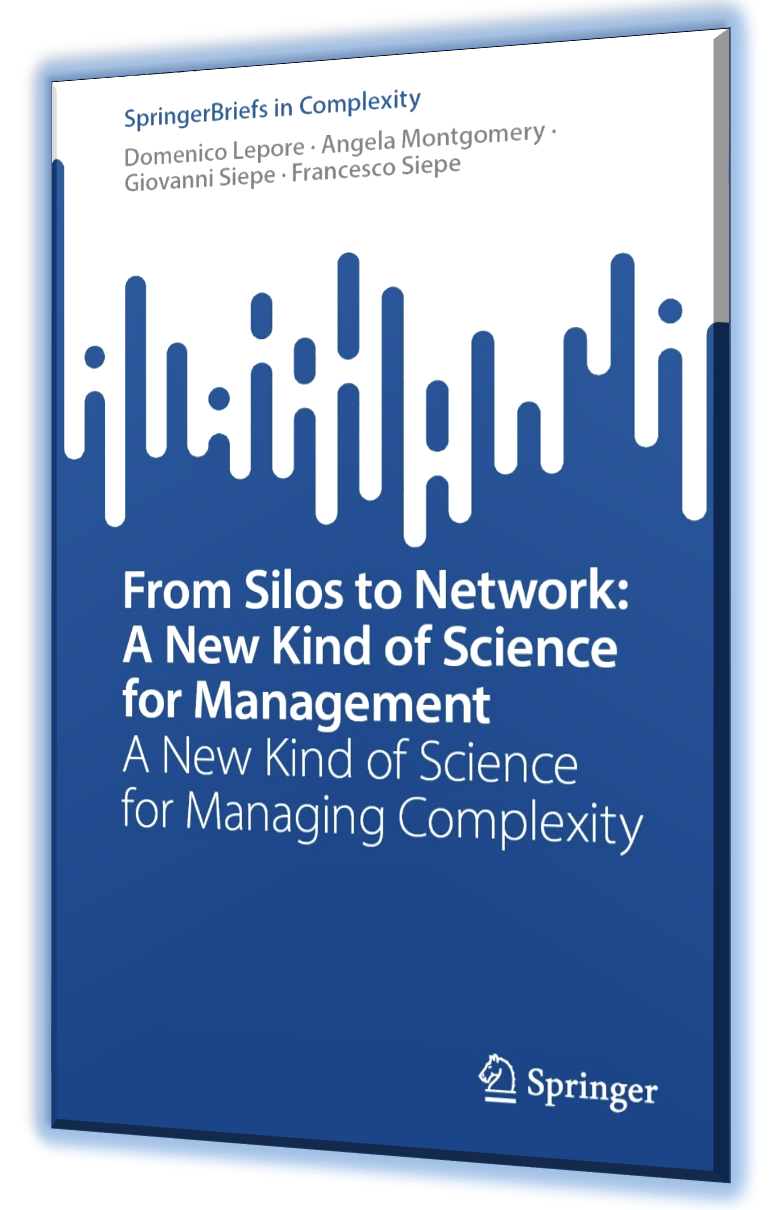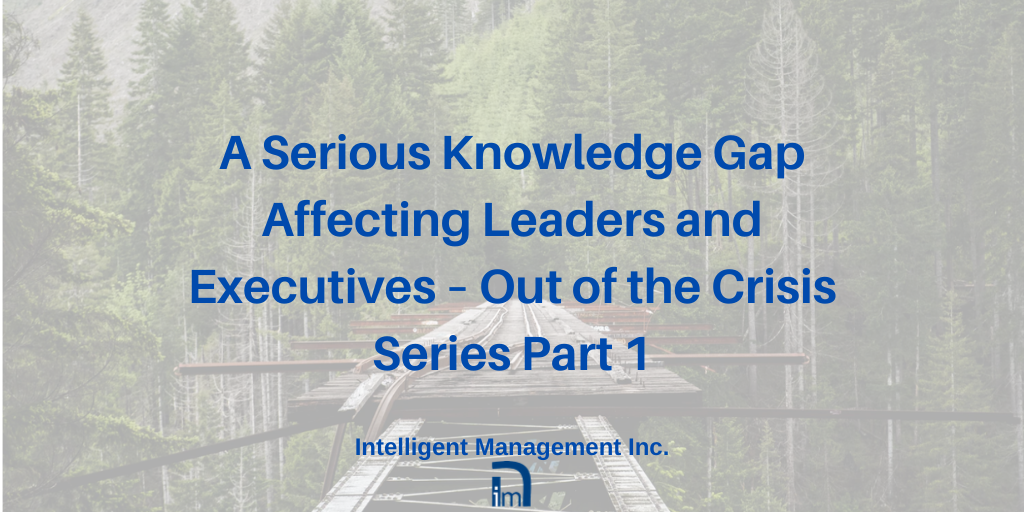Introducing this series
We decided to publish this series to comment on what we see as urgent leadership issues. The multiple global crises the world is experiencing are highlighting a serious knowledge gap affecting leaders and executives. This gap leaves them unprepared to interpret and respond with speed to complex, non-linear phenomena. It is nothing short of what a recent New York Times article refers to as an epistemological crisis.
The majority of leaders today still rely on anachronistically mechanistic and linear thinking. This is reflected in and reinforced by the flawed economic and financial models that still predominate. The organizational paradigm that stems from these flawed models is one of separation. It creates siloed traditional functional/ hierarchical organizations that impede the speed of flow of materials, money and information. All this results in sub-optimization in the way human abilities and available physical resources are deployed. A new kind of science has been accessible for decades that is appropriate for understanding the complexity created by the unprecedented level of global interdependencies that now exist. Systems science and network theory can aid us in replacing a paradigm of separation with an understanding of complexity. Understanding variation and constraints can provide an operational way to accelerate flow, optimize the way resources contribute to the goal and lay the basis for sustainable prosperity. Achieving a new economics and a new covenant for sustainable prosperity requires the ability to think systemically and challenge assumptions that prevent us from progressing from a zero-sum game mentality to one of collaboration and win-win. This is what our new series addresses.
A serious knowledge gap
Over the last forty years, a rapidly increasing number of fields of human knowledge, from science to medicine, from epistemology to environmental studies, have turned to systems theory and systems thinking to gain a deeper insight into the basic mechanisms of life and its evolution. The findings have been pointing at certain basic features that we all share as living entities.
Rigorous study has proved that not only are divisiveness and individualism unsustainable in a globally interconnected world, they are contrary to the basic biochemical fabric of our very existence. The fields of economics, politics and management have been almost oblivious to these findings and, for the most part, continue to regurgitate the same old recipes; they continue to apply patches instead of acknowledging the new emerging paradigms. Win-Win conflict resolution, cooperation instead of competition, symbiosis instead of survival of the fittest, patterns not just structures; these today are some of the basic, well understood elements that a society must have in place to sustain its ambition to evolve and prosper and they are also the founding elements of our biological existence. Life, as we experience it on this planet at every level, is based on interdependencies and interconnections. We exist, as Fritjof Capra pointed out, within a “web of life”, a network of interdependencies that cannot be understood solely in terms of its basic components but that has to be studied in terms of its interrelations.
What has gone wrong in the ability to understand and cope with our new, complex reality? Not only have we failed to learn from mistakes, the game has now changed so drastically that what may have been valid in the past is no longer the case. Interdependencies and interconnections multiply at an ever-increasing speed and the cause-and-effect relationships that govern the world as we experience it form a complex ‘network of networks’. The majority of people, including political and industrial decision makers, have a very limited understanding of the underlying properties of these networks, the laws of physics that govern them and the non-linear phenomena that emerge from them.
Flawed economic and financial models
The lack of understanding of new paradigms of complexity, networks and systemic interactions has a profound effect on the way we think about using the finite resources available on our planet. Our mind grasps at straws any time we have to come to terms with the implications of the non-linear laws that govern networks. We can see how completely disconnected mainstream thought is from this awareness when today undergraduate students are still taught the ludicrous concept of “the invisible hand” of the market and the frankly hilarious models that sustain the “supply and demand” approach to economics. Indeed, Nobel Prizes are being won for providing strong empirical evidence that “rational decisions” are not an intrinsic part of our human experience. In other words, we already have the knowledge and the tools to do so much better than this, but we continue to lag behind that potential.
The situation is exasperated by the fact that mainstream economic and financial models, the ones that currently rule the markets and determine value, have shifted their focus over the decades from achieving what is best for the society that they should try to model towards what is mathematically possible for the benefit of a few. We use the word “mathematically” with a sense of grief. Mathematics is a very serious business; it is thanks to mathematics that we understand the physical world and it is thanks to its rigorousness that we are confident that the scientific method can provide acceptable validity. Sadly, the models of most economists and financiers are far from being the offspring of any scientific method.
There are two main sets of reasons for which current mainstream economic and financial models are flawed:
- They are often divorced from realistic assumptions about the situation they seek to model AND from the managerial actions that should ensure the predicted outcome. In other words, the modeling happens in the vacuum of second tier “mathematical” speculations with flawed assumptions about what is possible or impossible to achieve managerially in the real world.
- Far too many, and often prevailing, economic and financial models pursue an idea of value that is divorced from any concept of the general wealth and well-being of individuals and society. Such models are based on a systematically disproven “rational” behavior driven by the desire for individual profit. These models are rooted in the paradigm that if somebody wins somebody else has to lose. It is a zero-sum game. They call it “competition” and a gigantic and ineffective apparatus has been created to “ensure” fair competition.
The ugly truth is that the prevailing economic and financial thinking has led to the squandering of the resources that the planet has available and to the stifling of innovation. This thinking has systematically favoured short-term decisions over long-term planning. This thinking has swayed tens of thousands of talented people away from applying their minds to constructive and foundational work and towards the sterile and artificial domain of “financial products”. This thinking has led us to believe that we can create something out of nothing.
Never in human history has the word “scarcity” meant so much. Our resources are scarce and we need to learn how to use them; the name of the game of any serious economic effort then becomes “sustainability”. We need a new economics, one that becomes the science that studies the optimization of scarce resources and that, in order to do so, must tap into the bodies of knowledge that deal with the way finite resources can be successfully managed.
Other articles in this ‘Out of the Crisis’ series:
Part 1: A Serious Knowledge Gap Affecting Leaders and Executives
Part 2: What’s Wrong with Organizational Structures?
Part 3: Viral Insights from Managing Variation and Constraints
Part 4: How to Manage Decentralized Work
Part 5: Learning to Think Systemically to Make Informed Decisions and Pre-empt a Crisis
Part 6: Identifying Assumptions to Unlock Innovation and Move Beyond the Crisis
Part 7 A New Economics for Sustainable Prosperity
Contact: intelligentmanagement@sechel.ws
SCHEDULE AN INTRODUCTORY CALL WITH US







Leave a Reply